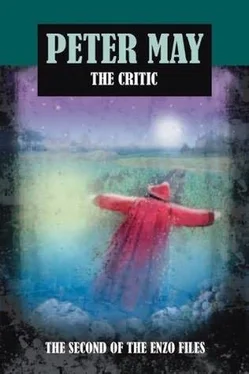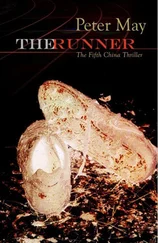Peter May - The Critic
Здесь есть возможность читать онлайн «Peter May - The Critic» весь текст электронной книги совершенно бесплатно (целиком полную версию без сокращений). В некоторых случаях можно слушать аудио, скачать через торрент в формате fb2 и присутствует краткое содержание. Жанр: Классический детектив, на английском языке. Описание произведения, (предисловие) а так же отзывы посетителей доступны на портале библиотеки ЛибКат.
- Название:The Critic
- Автор:
- Жанр:
- Год:неизвестен
- ISBN:нет данных
- Рейтинг книги:5 / 5. Голосов: 1
-
Избранное:Добавить в избранное
- Отзывы:
-
Ваша оценка:
- 100
- 1
- 2
- 3
- 4
- 5
The Critic: краткое содержание, описание и аннотация
Предлагаем к чтению аннотацию, описание, краткое содержание или предисловие (зависит от того, что написал сам автор книги «The Critic»). Если вы не нашли необходимую информацию о книге — напишите в комментариях, мы постараемся отыскать её.
The Critic — читать онлайн бесплатно полную книгу (весь текст) целиком
Ниже представлен текст книги, разбитый по страницам. Система сохранения места последней прочитанной страницы, позволяет с удобством читать онлайн бесплатно книгу «The Critic», без необходимости каждый раз заново искать на чём Вы остановились. Поставьте закладку, и сможете в любой момент перейти на страницу, на которой закончили чтение.
Интервал:
Закладка:
‘If you go to California, you’ll be flying from Paris?’
‘Probably.’
‘Stay over at my place before you go, then.’ She slipped cool fingers behind his neck and gently pulled his head down so she could kiss him. And then she stepped into the car, backing up before accelerating away on the long drive through the trees to the road.
He watched her go, filled with love and frustration and anger, and wondered if he would ever understand her.
A tugging at his feet drew his eyes down, and Braucol sprang away, never tiring of his party trick, eyebrows pushed up in anticipation of admiration or admonishment. Either would do.
Chapter Thirteen
I
‘Hold still!’
Enzo sat in the chair with his tongue sticking out, and struggled to prevent it from twitching involuntarily.
Bertrand held his head back with one hand, and with the other squeezed the rubber nipple of his eye-dropper to let the blue food dye drip on to the tip of Enzo’s tongue.
‘Now keep your tongue out, don’t swallow.’
Enzo gurgled incoherently as Bertrand pressed the punched hole in a sheet of paper on to the end of his tongue and brought a magnifying glass up to his eye. He started counting the fungiform papillae visible in the hole.
‘Twenty-seven,’ he said. ‘Which puts you bang in the middle category. A taster.’ He gave Enzo his tongue back, and watched as the older man pulled a face and washed away the food dye with a glass of water.
Bertrand had explained the experiment before dropping dye on to each of their tongues in turn. The tongue would take up the dye, he told them, but the small round structures of the fungiform papillae, or taste buds, stayed pink, allowing them to be counted. Fewer than fifteen, concentrated in the seven millimetre hole in the sheet of paper, classified you as a nontaster. Fifteen to thirty-five, as a taster. And more than thirty-five made you a supertaster.
Nicole had been delighted to learn that she was a supertaster, until Bertrand told her that this wasn’t necessarily a good thing. ‘If you’re too sensitive to taste, then you can end up with flavour overkill. Things are too sweet, or too bitter, or too salty.’
Bertrand, Sophie, and her father all had average counts in the fifteen to thirty-five middle range.
‘We can only perceive five different tastes.’ Bertrand was warming to his subject, revelling in his knowledge. ‘Sweet, salty, bitter, sour, and umami — which is a Japanese word that translates as meaty or savoury.’
Enzo looked at the young man with renewed admiration. He really did know his stuff. However, this was an area about which Enzo also knew a little. ‘But we’re sensitive to thousands of smells,’ he said. ‘Although we can only identify up to a maximum of four odours at any one time in any mixture, regardless of whether it’s a single molecule odour, like alcohol, or something more complex, like smoke.’ He grinned. ‘So the next time you see some flamboyant wine review, extolling the virtues of a half dozen or more wonderful aromas, you’ll know just what bullshit it really is.’
Bertrand took up the baton again. ‘The hardest thing, though, is to identify the smells. The olfactory epithelium…’
Sophie pulled a face. “All factory what…?’
‘Epithelium,’ Enzo said. ‘The tissue that traps and identifies smell molecules.’
Bertrand ignored the interruption. ‘The olfactory epithelium in humans is only about a fifth as sensitive as cats, and we just don’t live in the same smell universe as dogs.’ He looked at Braucol, who cocked his head and looked back at him. ‘If dogs could taste wine, Robert Parker would be out of a job.’ He turned back to Enzo. ‘What made Gil Petty almost unique, was his ability to remember smells, to classify them in some way that allowed him to associate them with words.’
Enzo nodded. ‘Michelle said he had the smell equivalent of a photographic memory.’
Bertrand started lining up bottles and glasses. ‘It’s much harder than you think to identify a smell. The first day of my training course, they gave us little bottles of clear liquid infused with different odours. Some were easy, like peach, or strawberry. Others were impossible. You recognised the smell, but couldn’t for the life of you say what it was. Until the prof would tell you it was ground pepper. And immediately you thought, of course it is! Why the hell couldn’t I tell that?’ He turned to face the others. ‘It’s a long, hard learning process.’
‘It can’t be that hard, surely?’ Nicole said. ‘I mean, we’ve all got the same sense of taste and smell. Except for me, of course. I’m a supertaster.’
Bertrand started pouring a little wine into each glass. ‘They did this experiment in Italy with something called fMRI. I’m not sure what it stands for.’
‘Functional magnetic resonance imaging,’ Enzo said. ‘It’s an MRI scan specifically applied to the brain. It allows scientists to actually see the brain working.’
‘Well, anyway, they did this experiment taking seven professional sommeliers and seven other people matched for age and sex, who didn’t have any specific wine-tasting abilities, and scanned their brains while they fed them different wines.’
‘Hmmm, I’d have volunteered for that,’ Sophie said.
Bertrand tipped her a look of mild annoyance. ‘While the wine was actually in the mouth, it stimulated activity in the same area of the brain in all fourteen participants.’
Nicole let a little explosion of triumph escape her lips. ‘Like I said, we’ve all got the same sense of taste and smell.’
But Bertrand shook his head and raised a finger. She was being premature. ‘No, you’re wrong, Nicole. Because there was another area of the brain that showed activity only in the sommeliers. And then during the aftertaste phase, when they’d swallowed the wine, the sommeliers had brain activity on both sides of the…the…amagama hippo something…’
‘Amygdala-hippocampal?’ Enzo suggested.
‘That’s it. Well, the professionals showed activity on both sides of that, and the others only on the right side.’
‘So what’s your point?’ Nicole was impatient to get on with the tasting.
‘Well, the experiment showed that the professional tasters were accessing parts of their brains that the nonprofessionals weren’t, almost certainly consulting database material accumulated through training and experience. You can’t just walk in off the street and be a professional winetaster, you know It’s a learned art, and it takes time.’
‘Not much point in us even trying then, is there?’ Nicole was skeptical.
‘Well, let’s see,’ Enzo said.
Bertrand spread the tasting information sheets from the Maison du Vin across the kitchen worktop and handed them each a glass. ‘Okay, this is how we do it. We hold the base of the glass between thumb and forefinger, and tip it away from us, preferably towards something white. We’re looking for the colour here, and how the light strikes through it.’
In silence, they all did as they were told, peering at the wine through tilted glasses.
‘Okay, so this is the Sarrabelle syrah. Petty described the colour as being tile red. Like terracotta tiles on a roof. You can see what he means. It’s a good, strong red, but if you look around the edges of it, there’s a slightly brownish quality that gives it a sort of brick colour. That comes with age and oxidation. This wine’s five years old now, so it’ll be browner than when Petty looked at it.’ Bertrand glanced up at Enzo’s whiteboard. ‘He also suggested that it would have a drinking life of five to eight years. So it should be perfect for drinking right about now. Let’s see if he was right.’
Читать дальшеИнтервал:
Закладка:
Похожие книги на «The Critic»
Представляем Вашему вниманию похожие книги на «The Critic» списком для выбора. Мы отобрали схожую по названию и смыслу литературу в надежде предоставить читателям больше вариантов отыскать новые, интересные, ещё непрочитанные произведения.
Обсуждение, отзывы о книге «The Critic» и просто собственные мнения читателей. Оставьте ваши комментарии, напишите, что Вы думаете о произведении, его смысле или главных героях. Укажите что конкретно понравилось, а что нет, и почему Вы так считаете.












